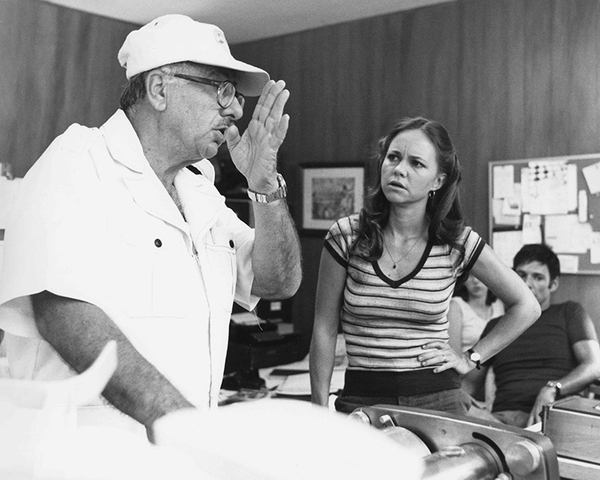Committed
Martin Ritt, the filmmaker of ordinary heroes
PostED ON 16.10.2025
M.A.R.T.I.N. R.I.T.T., what does it stand for? Here are a few clues to help you understand the director to whom Lumière is paying tribute, a man of an authentic, profound, boundless America, with love and loyalty!

© 1979 Twentieth Century Fox Film Corporation
Martin Ritt sur le tournage de Norma Rae (1979)
McCarthyism. Martin Ritt is a political filmmaker! As a young man, he belonged to the Federal Theater Project, which performed radical left-wing plays across America, resulting in him being blacklisted during the McCarthy era between 1947 and 1950 and even later. While directing and producing adaptations of plays for television, he was fired, accused of sympathising with the USSR, but he turned his experience into a film, The Front, the tale of an apolitical man who lends his name to a blacklisted screenwriter...
Actors. Ritt left television in 1956 and became an assistant to Elia Kazan at the Actor's Studio. This was hardly surprising for a man who had begun his career as an actor. His go-to artist was Paul Newman, who played tenacious outsiders, overturning everything in his path, which proved that Newman was a fine actor and a man of conviction, like Ritt. From 1958 to 1967, collaborating on The Long, Hot Summer, Paris Blues, Hud and Hombre, the duo enjoyed a considerable run of hits.
Racism. Ritt often cast African-American actors in pivotal roles. His first film, Edge of the City, explores an interracial friendship—a rare theme at the time—between Sydney Poitier and John Cassavetes against the backdrop of trafficking on the docks in New York. This theme of racism is revisited in Hombre, this time involving Native Americans, featuring a white man who was raised by an Apache tribe.
Theatre. After the Great Depression of 1929, Martin Ritt, who was born in 1914, joined the left-leaning Group Theatre as a young man to perform on stage.
Ideals. Ritt, who came from a wealthier part of New York, was shaped at a very young age by seeing the poverty in the American south. His œuvre denounces inequality. Always set on a human scale, they take place in every corner of the United States.
Norma Rae. Sally Field, in the title role, earned an Oscar for her incarnation of this heroine, a factory worker who joins a union and stands up for her rights.
Rambo. In 1973, Warner hired Ritt to direct Paul Newman in the role of outsider John Rambo, with Robert Mitchum as the sheriff! Obviously, the project never came to fruition.
Intimacy. Ritt also films his characters’ interior struggles. With a propensity toward friendships and romantic relationships, he highlights the lives of couples in No Down Payment, single women in Cross Creekand Murphy's Romance, and, more surprisingly, the soul of an introvert in the remarkable work The Spy Who Came in from the Cold.
Traître sur commande (The Molly Maguires). This is perhaps Ritt's greatest film, bringing together everything: politics, workers' rights, friendship, love... Set in 19th century Pennsylvania, a detective infiltrates a group of miners rebelling against the mine owners, featuring Sean Connery, Richard Harris and Samantha Eggar.
Tribune. Ritt remained loyal to his solitary figures until his death in 1990. He gave them a platform to express their differences. Norma Rae unfurled her protest banner of grievances, as did Barbra Streisand in the courthouse drama Nuts, while Jane Fonda stood up for Robert De Niro in Stanley & Iris.
Virginie Apiou
The Programme
Edge of the City by Martin Ritt (Edge of the City, 1957, 1h25)
Lumière Bellecour Thu 16 8pm
No Down Payment - in VOI by Martin Ritt (No Down Payment, 1957, 1h45)
Institut Lumière (Villa) Thu 16 9am | Institut Lumière (Villa) Thu 16 9:15am
The Long, Hot Summer by Martin Ritt (The Long, Hot Summer, 1958, 1h57)
Tassin la Demi-Lune Thu 16 8:30pm | Institut Lumière (Hangar) Fri 17 1:45pm
Paris Blues by Martin Ritt (1961, 1h38)
Pathé Bellecour Thu 16 4:30pm | Lumière Terreaux Fri 17 4pm | Cinéma St-Denis Sat 18 2:30pm
Hud by Martin Ritt (Hud, 1963, 1h52)
UGC Confluence Thu 16 9pm | Lumière Terreaux Sat 18 2pm | Institut Lumière (Hangar) Sun 19 4:30pm
The Spy Who Came in from the Cold by Martin Ritt (The Spy Who Came in from the Cold, 1965, 1h53)
Oullins-Pierre-Bénite Thu 16 8pm | Institut Lumière (Villa) Fri 17 4:30pm | UGC Astoria Sun 19 11am
Hombre by Martin Ritt (1967, 1h51)
UGC Confluence Thu 16 1:45pm | Comœdia Sat 18 2:30pm
The Molly Maguires by Martin Ritt (The Molly Maguires, 1970, 2h05)
Institut Lumière (Hangar) Fri 17 11am | Pathé Bellecour Sat 18 10:45am | Lumière Terreaux Sun 19 4:30pm
The Front by Martin Ritt (The Front, 1976, 1h35
Institut Lumière (Villa) Thu 16 9pm | UGC Confluence Sun 19 2:30pm
Norma Rae by Martin Ritt (1979, 1h54
CinéDuchère Sat 18 5pm | Pathé Bellecour Sun 19 10:45am
Cross Creek by Martin Ritt (Cross Creek, 1983, 2h
UGC Confluence Thu 16 4:15pm | UGC Confluence Fri 17 1;45m | UGC Astoria Sat 18 11am
Murphy's Romance by Martin Ritt (1985, 1h47)
Lumière Terreaux Sun 19 11am
Nuts by Martin Ritt (Nuts, 1987, 1h56)
Institut Lumière (Hangar) Fri 17 4:30pm
Stanley & Iris by Martin Ritt (Stanley & Iris, 1990, 1h45)
UGC Astoria je 16 20h15 | Lumière Terreaux ve 17 18h15

